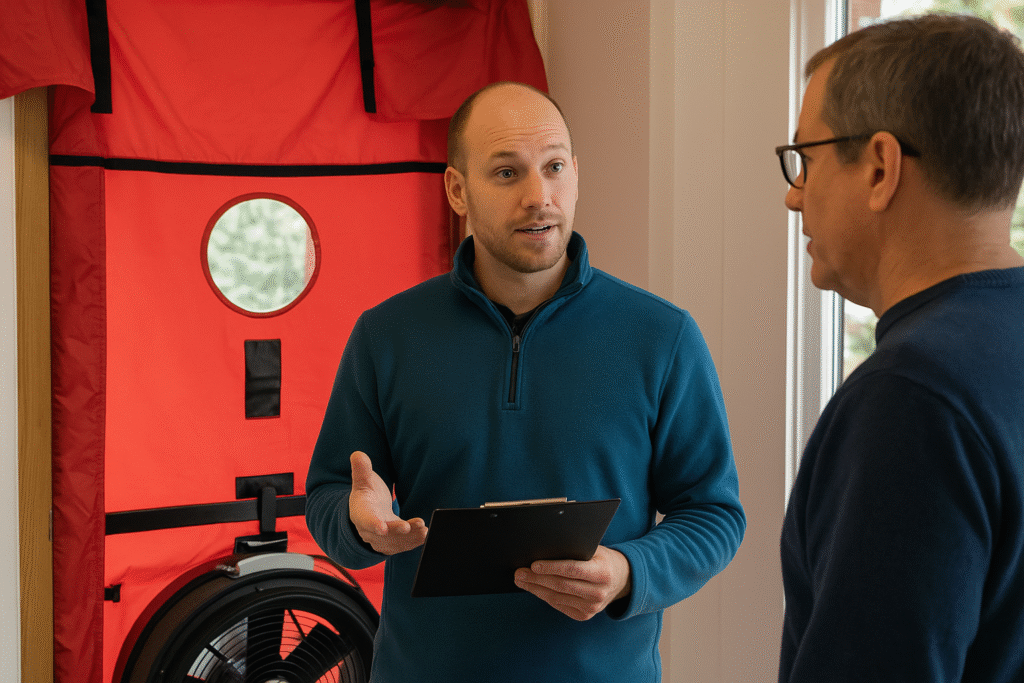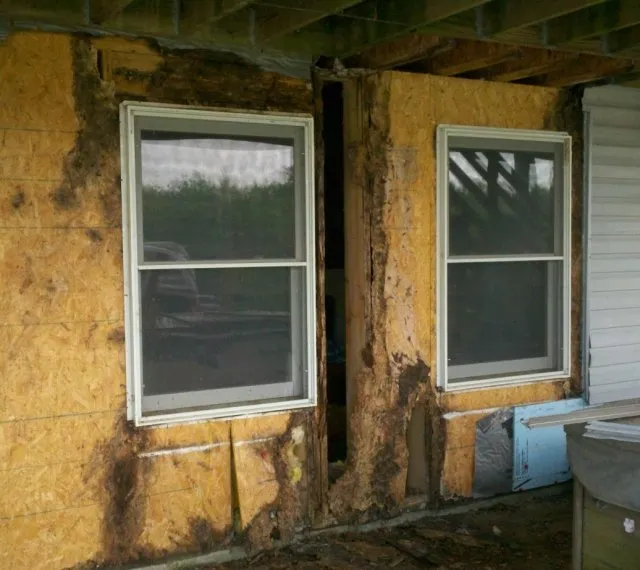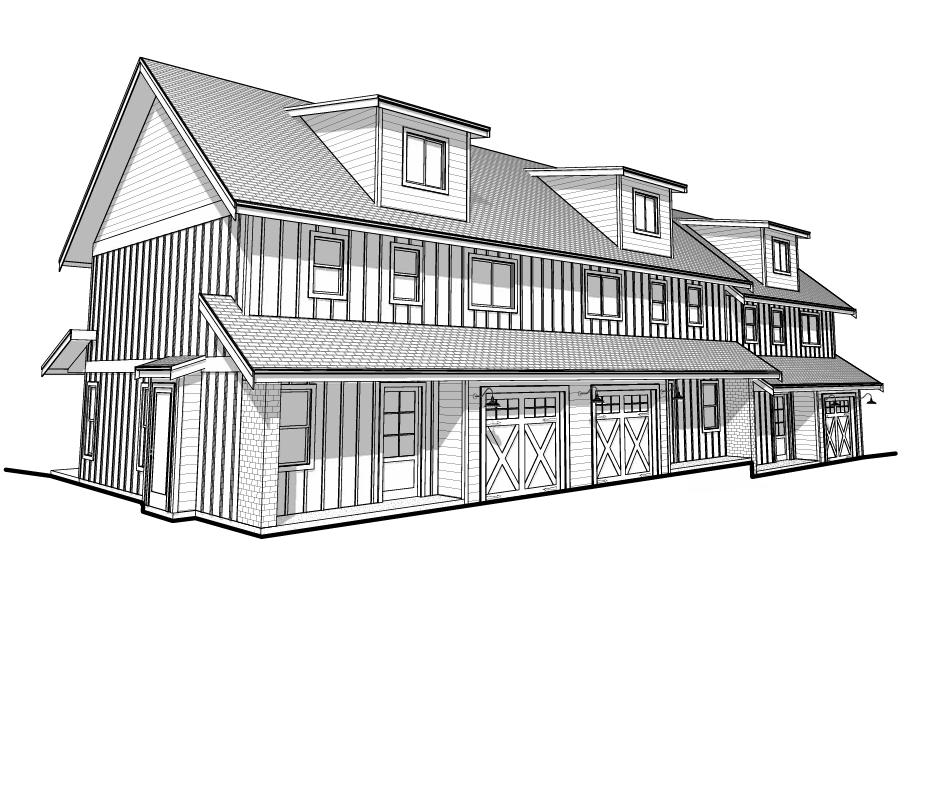By Thrive Energy Inc.
When you hear the term “Energy Advisor” (or REA), you might picture someone running a blower door test on a new build. And while that’s part of it, there’s a lot more that goes on behing the scenes. Registered Energy Advisors (or at least the good ones) are trained professionals who understand how buildings use and lose energy, and their job is to help you make smart, cost-effective improvements thoughout a new home build or existing-home retrofit project based on data & facts, not sales pitches. Registered Energy Advisors are required by their licencing agreement with Natural Resources Canada to be a non-biased source of information, looking out for the clients and the project’s best interest.

What It Takes to Become a Registered Energy Advisor
To become a Registered Energy Advisor in Canada, a person must be trained and registered through Natural Resources Canada (NRCan). The process involves both technical education and practical experience.
Here’s what it takes:
- Complete specialized coursework in building science, energy modeling, house as a system, and heat transfer principles
- Understand Canadian building codes, building envelopes, insulation systems, HVAC system operation & design, window & door specifiactions, and ventilation best practices
- Pass two national exams – the NRCan Foundation Exam and the Energy Advisor Exam, and a re-certification exam every 3 years.
- Work with an approved Service Organization (SO) that provides mentorship, review, and quality assurance on an ongoing basis
At Thrive Energy, our team of Registered Energy Advisors works under Isle Energy Consulting, a licensed Service Organization in excellent standing with NRCan. This partnership ensures that every file we deliver meets strict federal and provincial standards for accuracy, consistency, and compliance. On top of the base registration requirements, we pride ourselves on participating in as much continuing education as possible. We work in an ever-evolving industry and a good EA needs to stay on top of the changes to be effective at their job. We participate in several industry organizations and committees, such as the Canadian Home Builders Assosiation (CHBA), Canadian Assosication of Consulting Energy Advisors (CACEA), and many more, to ensure we’re up to date on the newest building science and industry standards. This is what sets us apart from the base-case EA that has just satisfied the bare-minimum requirements for Energy Advisors set out by NRCan.
What Energy Advisors Actually Do
The work of an Energy Advisor has evolved over the past decade. Today, REAs support a range of services across both new and existing homes:
- BC Building Step Code compliance and energy modeling for new construction
- Deep Energy Retrofit consulting & assessments for existing homes
- CMHC MLI Select energy and GHG modeling for multi-unit residential buildings (assessing multi-unit residential buildings requires additional course-work and an NRCan administered exam)
- Blower door testing and air leakage diagnostics
- CSA F280-12 heat loss/heat gain calculations for new and existing homes, required proper HVAC system sizing (training is above and beyond requirement for EA’s)
- Duct flow testing and thermal imaging to pinpoint hidden inefficiencies (training is above and beyond requirement for EA’s)
- Integrated Design Process Faciliation to ensure our projects run smoothly and hit our targets without any unforseen issues (this is another optional, intensive course that is above and beyond the scope of the base-case EA.)
In all, Energy Advisors are data specialists for buildings, using software, testing, measurements, and building science to help homeowners and builders make informed decisions. They should be able to educate the contractor or homeowner on all recommended changes for energy efficiency improvments, in coordination with consideration for health, safety, cost and occupant comfort. E.g. radon testing needs to be considered in every home, especially before an energy advisor recommends air sealing.
A quality EA will also look at the potential unintended consequences of piecemeal upgrades. We want to ensure that the house functions well as a system, and that one upgrade consideration does not move the home out of equilibrium with another, causing excessive moisture, inadequate ventilation, or other indoor air quality issues.

Why Homeowners Benefit from Talking to an Energy Advisor First
Before hiring contractors, window suppliers, insulators or HVAC companies, it’s worth starting with an Energy Advisor. Here’s why:
- They’re independent. Energy Advisors aren’t tied to any specific product or system, so their recommendations are unbiased and based on performance data. We are about the end result, which is ensuring the home is healthy, comfortable, and durable for the forseeable future.
- They see the whole picture. An advisor looks at your home as a system: the building envelope, insulation, ventilation, heating, cooling, and how they all interact.
- They provide measurable insight. Using energy modeling and diagnostic testing, they can show where your home is wasting energy and what upgrades will make the biggest impact.
- They help you prioritize. Instead of chasing the latest rebate or sales pitch, you’ll understand what truly improves comfort, efficiency, and long-term value, all factors of your home considered.
- They help you make educated decisions. We’ll use our experience to assist in quote reviews, optimizing building plans and designs, and help navigate incentive programs to ensure qualification.

How to Choose the Right Energy Advisor
Not all Energy Advisors specialize in the same type of work. Some focus on new construction, while others excel in existing home retrofits or multi-unit projects. When choosing who to work with, ask about:
- Their experience with your type of home or project scope
- Whether they perform on-site testing and diagnostics or only modeling
- Will they assist with building performace decisions and optimization options
- Are they flexible in regards to facilitating different options to achieve the end goal, or are they focused on their own ideals?
- How clearly they explain results and recommendations – will they take the time to answer in-depth questions and be responsive by email, phone and text?
- Rebates – If you’re building a new home, are they talking about this option with you?
- Their affiliation with a licensed Service Organization — in Thrive’s case, that’s Isle Energy Consulting.
- Their timelines for processing files & assisting in submitting rebate applications. (do they bill for submitting rebate applications?)
The right Energy Advisor won’t just hand you a report, they’ll help you understand what it means and what steps to take next. This is a really important one and I can’t emphasize it enough.
Our company is constantly answering homeowner queries, explaining report details that aren’t clear to the lay-person, delving further into how different parts of the home interact to give clear information on the issues or concerns that the homeowner might be experiencing. Offering and faciliating options to builders or developers on how to cost-optimize a project to meet efficiency targets is dollars back in a company or homeowner’s pocket.
We have seen some energy consulting companies use high pressure sales tactics and low quality energy modeling to pump out generic, and franky, incorrect reports. This type of operation gives the industry a poor reputation professional conduct, client care and customer service.
Be selective with who you hire as your Energy Advisor. Ask the right questions. Get a few different quotes, but I don’t recommend choosing your Energy Advisor solely based on bottom-of-the-barrel pricing. As is unfortunately the case in any industry, there are some really great apples and… there are also some bad apples.

The Bottom Line
A Registered Energy Advisor is your independent expert for understanding how your home or build project will perform and where to focus your attentions and money. Whether you’re building new or retrofitting an older property, starting with a qualified, customer service-oriented Energy Advisor gives you a clear, unbiased roadmap before any sales conversations with contractors even begin. We can give you cost saving insights, so that you can go to sub-contractors with data-backed information to support your needs. (For example; having a qualified EA perform your CSA F280-12 heat loss heat gain calculation can save you $$$ on mechanical equipment – you may be able to downsize from the planned HVAC equipment based on real data associated with your project.)
If you’re curious about what upgrades will have the biggest impact on your home, check out our Energy Consulting Services page to learn more about how we can help.
About the Author
Brett Tracy is the Principal Energy Advisor and founder of Thrive Energy Inc., based in Kelowna, BC.
Thrive Energy’s team of Registered Energy Advisors provides residential energy modeling, blower door testing, Step Code compliance, and retrofit consulting throughout the Okanagan in addition to many other services.
All NRCan-regulated work is performed under Isle Energy Consulting, a Service Organization licensed by Natural Resources Canada.
www.thriveenergyinc.com
brett@thriveenergyinc.com
778-867-0242

